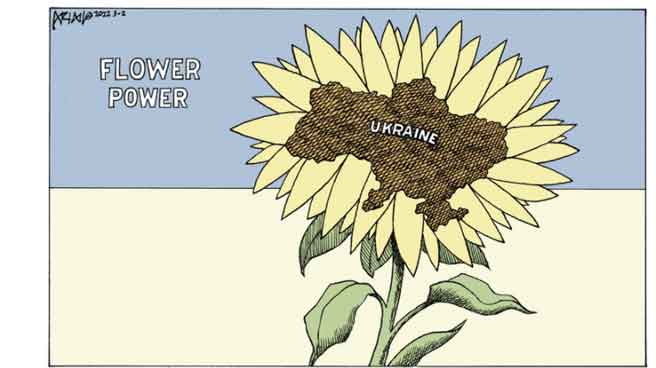
The challenge today is not remotely comparable -- we are largely protecting the status quo from revanchist powers rather than writing on a blank slate. Yet the twin threat from Russia and China requires new thinking, especially in meeting national needs not necessarily addressed by the free market alone.
We must focus on maintaining a first-class military, winning the high-tech race with China, and reducing our vulnerabilities in the event of a war that disrupts supply chains and our access to key strategic materials and goods.
We need to restore the defense industrial base, which has atrophied considerably. We can't build enough missiles to replenish our stocks quickly enough in a conflict. We can't build new submarines on schedule or maintain the ones we have. In general, the Navy doesn't have enough capacity to repair its ships in peacetime, let alone at war.
Air Force depots, too, are lacking. All of this will require major new investment.
A model of the potential synergy of government and private industry in such areas is how Elon Musk's SpaceX has revitalized the U.S. space program. For years, NASA had come to rely, humiliatingly (and dangerously and expensively), on Russian rockets to get to space. Then, it opened a competition for private companies to build spacecraft. Musk came out ahead and has shaken NASA out of its decades-long bureaucratic mediocrity.
We need massive support for research and development, the predicate for technological advancement. Robert Atkinson of the Information Technology & Innovation Foundation, who has thought deeply about new strategies to make the U.S. more competitive, notes that 60 years ago, we led the world in government investment in R&D, but have become a laggard since then.
We need to deploy public policy to secure the supply chain for strategically important goods. The pandemic put a focus on pharmaceuticals. An emphasis lately, for understandable reasons, has been semi-conductors, an indispensable component of a modern economy.
Even though the U.S. created the industry and still leads in chip design, our share of global semiconductor manufacturing has fallen substantially, from nearly 40% 30 years ago to 12% now. More importantly, the U.S. doesn't manufacture the most advanced semiconductors, with Taiwan and South Korea accounting for all of this production. Taiwan is obviously directly in the crosshairs of China, and any supply from South Korea could be disrupted if there's a war in Asia.
U.S. companies aren't making their decisions about where to undertake manufacturing in the context of a level playing field. Foreign countries don't hesitate to provide government support to the fabrication of semiconductors on their soil. Beijing, of course, is a prime offender.
The CHIPS (Creating Helpful Incentives to Produce Semiconductors) Act that just passed the House spends $52 billion to support domestic production of chips and research and development.
Surely, some of these funds will be misallocated or prove unnecessary (and the broader House bill includes extraneous spending), but the legislation is, directionally, a welcome step away from unilateral disarmament.
It is much the same story with rare earths, the 17 metals used in the manufacture of magnets essential to weapons and electric cars, among other products. The U.S. created the industry, but China has leapt ahead since.
To place ourselves at the mercy of an adversary in such an important and sensitive area is insane. And China knows the leverage it has. It briefly blocked exports of rare earths to Japan a decade ago, and has issued similar warnings to the U.S.
All of this has to be grappled with, as we figure out how best to cope with a newly threatening geostrategic environment. "History is written backwards," Dean Acheson wrote, "but lived forwards."
(COMMENT, BELOW)


 Contact The Editor
Contact The Editor
 Articles By This Author
Articles By This Author